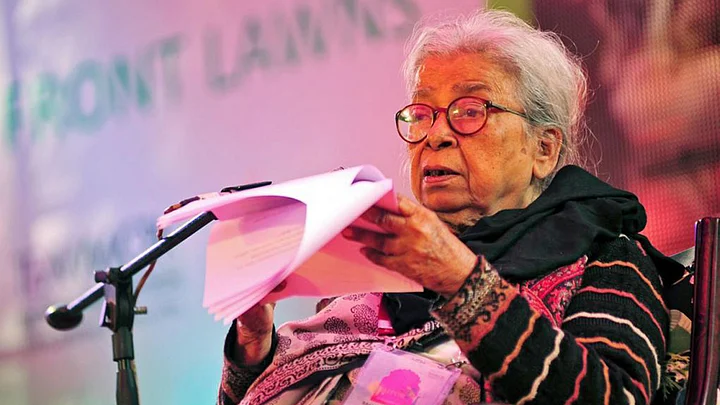By the time my literature class reached third year, we had been fed on a steady diet of western, primarily white feminism. We pretended to have read Simone de Beauvoir’s (impenetrable) The Second Sex from cover to cover. The French feminists had been grappled with and given up on. Our lexicon had expanded to include words like ‘patriarchy’, ‘homosocial’ and ‘heteronormative’. In other words, we ‘knew’ feminism.
Just when we were convinced that ‘this stuff’ was old hat, we read the English translation of Mahasweta Devi’s short story Draupadi, in a class on feminist theory. That day, a rattled and subdued class posed questions and engaged in discussion. Mahasweta Devi’s brutal, raw, naked, honest, un-embellished narrative had shattered our notions of feminism.
Feminism had ceased to be the exclusive domain of French, American or English academics. In one lecture, through one short story, Mahasweta Devi expanded our horizons, debunked theory and altered radically what feminism meant to us. To us blind, privileged Indian women, she introduced another India.
Mahasweta Devi changed my life. For the first time, feminism wasn’t just literary theory. Feminism was a battle cry that arose from the ranks of innumerable women, brutalised by gender violence. It was the embodiment of centuries of struggle and the indomitable spirit of the oppressed.
I realised that I knew nothing. My feminism was impotent; I knew very little of what was happening in my own backyard. While I familiarised myself with the white firebrands of yore, revolution had swept the hinterland of our country. Women, adivasis and ‘militants’ were being tortured and raped by the state, but undaunted, continued to fight.
My aunt indulged my interest (and inability to read Bengali) and gave me translated copies of her novels and short stories. Mahasweta Devi and her volume of work brought me closer to my activist aunt. For the first time, I understood what it meant to be spurred into action by a cause. A cause was not an empty ideal, it was the burning need to fight to change the course of history.
Mahasweta Devi taught me some hard lessons. Despite my solidarity with the movement against caste, class and gender violence, I am no activist. I do not have it in me to give up my bourgeois comforts and join the revolution. I am afraid and too fond of my sedentary, comfortable life to give it up.
Journalist. Author. Activist. Professor. Mahasweta Devi led by example. She didn’t just write about struggle; she participated in it, reported it, immortalised it. Unlike me, she didn’t take the easy way out. “Life has been too absorbing for me,” she said somewhere.
Rest in revolution, Mahasweta Devi.
(At The Quint, we question everything. Play an active role in shaping our journalism by becoming a member today.)
